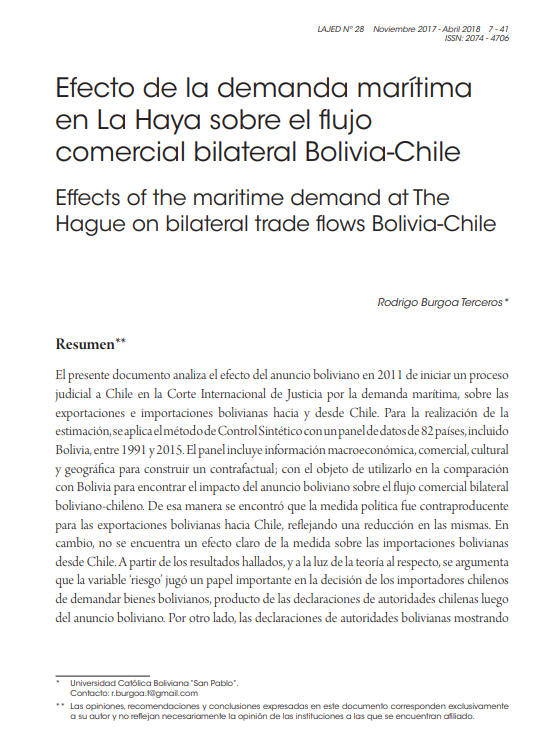Effects of the maritime demand at The Hague on bilateral trade flows Bolivia-Chile
DOI:
https://doi.org/10.35319/lajed.20172837Keywords:
Maritime demand, Bilateral trade, Political factors, Economic factors, Synthetic controlAbstract
This paper analyzes the effect of the Bolivian announcement in 2011 of taking Chile to the International Court of Justice, in order to solve the historic maritime demand, on Bolivian exports and imports toward and from Chile. The estimation is based on the method of Synthetic Control, with a data panel of 82 countries, including Bolivia, for the period 1991-2015. The panel includes information about macroeconomics, trade, culture, and geography, in order to construct a counterfactual and to use it for a comparison with Bolivia. Thus, it was found that the politic measure was negative for Bolivian exports to Chile. Instead, it was not found a clear impact on Bolivian imports from Chile. Using theory to explain the results, it is argued that the variable ‘risk’ played an important role for Chilean importers and their decision to demand goods from Bolivia. On the other hand, declarations of Bolivian authorities probably caused more certainty on their compatriots making risk no to rise too much in the decision to import goods from Chile.
Downloads
References
Abadie, A., A. Diamond y J. Hainmueller. 2015. “Comparative Politics and the Synthetic Control Method”. American Journal of Political Science, 59 (2), 495-510.
Abadie, A. y J. Gardeazabal. 2003. “The economic costs of conflict: A case study of the Basque Country American”. The American Economic Review, 93(1), 113-132.
Asociación Latinoamericana de Integración. 2017. AAP. CE Nº 22 Bolivia Chile. Disponible en: http://www.aladi.org/nsfaladi/textacdos.nsf/ca05a6ae01cc969583257d8100416d1e/22e99c149349183d032567ee007cef4f?OpenDocument
Banco Mundial. 2017. World Bank Open Data. Disponible en: http://data.worldbank.org/
BBC. 2013. “Bolivia denunciará a Chile por el caso de los soldados detenidos” (3 de marzo de 2013). Disponible en: http://www.bbc.com/mundo/ultimas_noticias/2013/03/130303_ultnot_bolivia_denunciara_a_chile_bd
Bolivia, Dirección Estratégica de Reivindicación Marítima. 2011. “Discurso del presidente Evo Morales”. Disponible en: http://www.diremar.gob.bo/node/265
---------- 2014a. El libro del mar. Disponible en: http://www.diremar.gob.bo/sites/default/files/LIBRO%20DEL%20MAR%20BILINGUE.pdf
---------- 2014b. “Chile y la demanda marítima boliviana, una realidad sin mitos”. Disponible en: http://www.diremar.gob.bo/node/976
Chile, Ministerio de Relaciones Exteriores. 2014. “Chile y la aspiración marítima boliviana. Mito y realidad”. Disponible en: http://www.mitoyrealidad.cl/mitoyrealidad/site/artic/20141230/asocfile/20141230145007/presentaci__n.pdf
---------- Servicio Nacional de Aduanas. 2017. “Estadísticas”. Disponible en: http://www.aduana.cl/cuadros-y-series-estadisticas/aduana/2016-09-14/143317.html
Gowa, J. 1994. Allies, adversaries, and international trade. Disponible en: https://web.stanford.edu/class/polisci243c/readings/v0002105.pdf
Kastner, S. 2007. “When Do Conflicting Political Relations Affect International Trade?”. The Journal of Conflict Resolution, 51(4), 664-688.
La Razón. 2011. “Chile dice que sus FFAA harán respetar tratados” (31 de mayo de 2011). Disponible en: http://www.la-razon.com/index.php?_url=/nacional/CHILEFFAA-HARAN-RESPETAR-TRATADOS_0_1404459561.html
Long, A. Agosto de 2003. “Does trade follow peace? Postwar bilateral trade and expectations for recurrent conflict”. En: Encuentro Anual de American Political Science Association (Filadelfia, Pensilvania, Estados Unidos).
Morrow, J. 1999. “How could trade affect conflict?”. Journal of Peace Research, 36(4), 481- 489.
Morrow, J., R. Siverson y T. Tabares. 1998. “The Political Determinants of International Trade: The Major Powers, 1907-90”. The American Political Science Review, 92(3), 649- 661.
Piñera, S. 2011. “Bolivia no puede revisar tratados de 100 años” (El País, 23 de mayo de 2011). Disponible en: https://elpais.com/internacional/2011/05/23/actualidad/1306101611_850215.html
Pollins, M. 1989a. “Does Trade Still Follow the Flag?”. The American Political Science Review, 83 (2), 465-480
---------- 1989b. “Conflict, Cooperation, and Commerce: The Effect of International Political Interactions on Bilateral Trade Flows”. American Journal of Political Science, 33(3), 737-761.
Simmons, B. 2005. “Rules over Real Estate: Trade, Territorial Conflict, and International Borders as Institution”. The Journal of Conflict Resolution, 49(6), 823-848.
Vaca, M. 2011. “Bolivia y Chile agitan las olas del mar” (BBC, 17 de enero de 2011). Disponible en: http://www.bbc.com/mundo/noticias/2011/01/110116_previa_encuentro_cancilleres_bolivia_chile_lr.shtml






